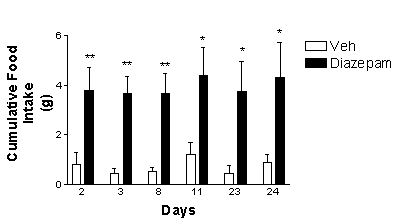| pA2 online © Copyright 2004 The British Pharmacological Society |
128P
GKT, University of London Winter Meeting December 2003 |
|
Effects
of chronic administration of diazepam on food intake and body weight
in rats |
|
It is well established that acute systemic administration of benzodiazepines (BDZ), such as diazepam, increase short-term food intake in non-deprived rats (Cooper, 1980). However, there is a paucity of studies that have examined the chronic effects of these agents on food intake. It is well known that tolerance develops to many of the pharmacological effects of the BDZs with repeated treatment (see Rang et al., 2001). It was therefore of interest to examine if tolerance occurs to the effects of diazepam on food intake after chronic exposure to the drug. In this study the effects of repeated daily administration of diazepam was investigated on short-term food intake and body weight in rats.
Adult male Wistar rats (b. wt. 350 - 450g; n=12) were divided into 2 equal groups of similar body weights and had free access to food and water. During experimental sessions, rats in Group 1 received vehicle (control) and rats in Group 2 received diazepam (4 mg kg-1). The rats were injected twice daily (10:00h and 16:30h) and cumulative food intake measured in experimental cages for 30 min immediately after the injection at 10.00h on days 2, 3, 8, 11, 17, 23 and 24. Body weight for each rat was recorded between 09:00 - 09:30h daily throughout the experimental period except for weekends. Daily injections carried on until days 24, but the body weight of the animals were measured until day 50. The results were analysed by ANOVA and the Student-Newman-Keul's post-hoc test.
The effects of chronic administration of diazepam (4 mg kg-1) on 30 min food intake is shown in Fig. 1. Diazepam significantly increased feeding on all measurement days and there was no evidence that tolerance occurred with chronic administration. There was a general increase in mean body weight for the control rats (Group 1) over the 24 days treatment period of approximately 12%. By contrast, the mean body weight was progressively and significantly (P<0.01) reduced in the diazepam treated rats (group 2) over the treatment period starting on treatment day 3. On day 24 weight reduction was 7.5%. After treatment with diazepam ceased, the body weights of the rats in Group 2 slowly returned to control values over the subsequent 2 weeks. The results of this study indicate that tolerance does not occur to the short-term hyperphagic effects of diazepam in rats following repeated administration. By contrast, there is a rapid and progressive loss of body mass. It is possible that diazepam may increase feeding acutely but decrease long-term (24h) food intake, which may result in a loss of body weight. However, we have shown in an additional experiment (unpublished results) that rats treated chronically with diazepam accurately regulate their daily (24h) food intake. Thus, the most likely explanation for this observation is that diazepam increases metabolism, perhaps by an action at peripheral BDZ receptors located on mitochondria (Parola et al., 1993).

Fig 1. The effect repeated administration of diazepam on food intake in rats. Vertical lines represent + s.e.mean *P<0.05, **P<0.01 Cooper, S.J. (1980) Appetite, 1, 7 - 19.
Parola, A.L. et
al. (1993) Life Sci., 52, 1329 - 1342.
Rang et al (2001) Pharmacology, Churchill-Livingstone, UK.